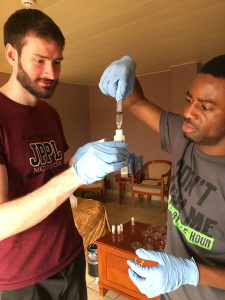McMaster-hosted UN think tank marks 25 years of water development research

BY Maureen Lawlor
October 28, 2021
In a world where one in three people live without access to safe drinking water, the United Nations University Institute for Water, Environment and Health (UNU-INWEH) aims to help bridge the gap between research and policy in the quest to make a difference in the lives of billions.
UNU-INWEH is one of 13 UN universities, think tanks aimed at resolving pressing global concerns — in this case, water security.
The institute, which is hosted by McMaster and operated through funding agreements with the Government of Canada, is marking its 25th anniversary.
Manzoor Qadir, UNU-INWEH’s assistant director, says the institute’s research and policy publications over the years have made a “unique contribution to science” and have gained worldwide media attention.
Qadir says people’s relationships with water often largely depend on where they live.
“There are pockets where every drop of water counts, [where] women travel for hours to collect water,” says the McMaster School of Earth, Environment & Society adjunct faculty member.
“Those countries which are water scarce, those populations are really suffering, and they know that their livelihood is very affected by the scarcity of water.”
Four million people die every year from water-borne diseases, according to the United Nations.
Despite this fact, Dr. Lina Taing, an adjunct faculty member in McMaster’s School of Earth, Environment & Society, says the general public is largely unaware of the scale of the global water crisis.
“It’s a wicked problem that entities like the UN still don’t fully understand,” says Taing, who is a researcher in water and health at UNU-INWEH.
“Ongoing research with global partners and academic collaborators from leading institutions like McMaster are needed to unpack these wicked problems.”
One of those collaborative measures is Water Without Borders, a graduate program run jointly by McMaster and UNU-INWEH.

Students from a range of faculties and departments conduct advanced water sector research and visit a lower-income country to apply scientific research to community-level initiatives.
Emerging sources of water are a research priority for UNU-INWEH, and Qadir says studies into their environmental impacts are vital.
He points to the process of desalination — or removing salt from seawater — which is often used in oil-rich countries in the Middle East and North Africa, as an example.
UNU-INWEH’s study found that the almost 16,000 desalination facilities around the world discharge more hyper-saline waste (brine) than they do usable water.
“They are basically pushing lots of brine back into the sea […] and that is affecting aquatic life.”
The study was covered by news organizations in 82 countries and led to the establishment of a global alliance supporting efficient brine management technologies.
Both researchers say the COVID-19 pandemic has reinforced the need for water development strategy.
“Three out of 10 people — that is, 2.3 billion people – do not have access to water and soap at home,” says Taing.
Qadir says the pandemic has also reinforced a need for investment in wastewater control.
“The collection, treatment and reuse of safely disposed wastewater is not only good for the environment, but also serves other purposes. It may help in the detection of COVID-like pandemics and could act as an early warning system.”
UNU-INWEH Director Vladimir Smakhtin says he hopes the coming years will see the institute continue to “be the best ‘go-to’ global water research centre oriented on sustainable water development.”
He pledges the institute will continue to offer new insights, tools and solutions as the United Nations projects global water demand to increase by more than 50 per cent by 2040.
The researcher says he hopes “that in the next 5–10 years, UNU-INWEH […] will help not just mitigate, but eradicate, some of the chronic water problems that the world faces.”


